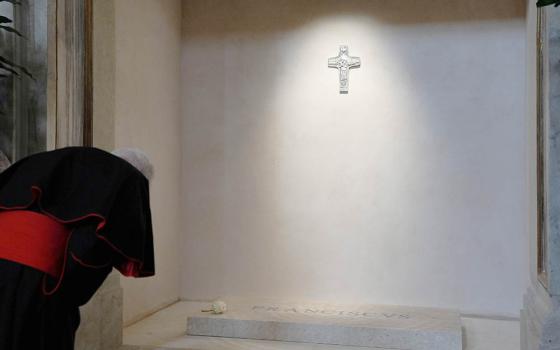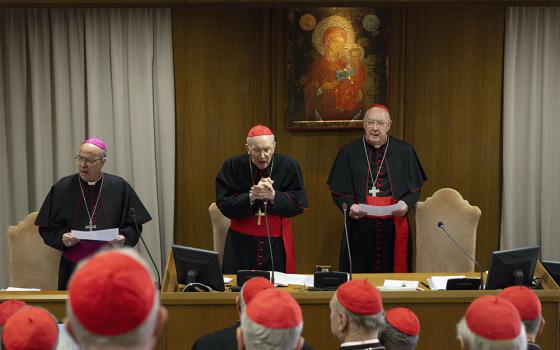Case # 1: A thirty-three year old woman, Mary Sue, living in Tennessee begins attending Mass with a Catholic friend. She is intrigued at first, but the more often she goes, the more she discovers the stirrings of grace in her heart. Mary Sue has not had an easy life, but at the Catholic Mass, something ineffable brings her solace and peace, and a new sense that life is more than just what our senses permit us to take from it. She and her friend begin dating and quickly discover that they share many interests, both want to start a family, and both consider their faith very important to them. She decides she wants to become a Catholic and, one Sunday, reads in the bulletin that there is an inquiry for joining the RCIA the following Wednesday night. She goes and the minister at the inquiry asks her about her life. She begins in the recent past, the lost job in 2008, going back to school in her late-20s, meeting her friend who became her boyfriend. Then, she mentions, that he boyfriend is so different from her husband who beat her and abandoned her eleven years ago. The movement of grace that brought this woman to this point now encounters a wall.
Mary Sue had gotten married when she was 19 years old to her high school sweetheart. Both were nominally Baptists and did not know a sacrament from a sausage, and even if they had been devout Baptists, it never would have occurred to them that marriage was a sacrament. But, they were not devout Baptists and on a trip to Las Vegas, where her high school sweetheart loved to go and gamble, they got married. Her high school sweetheart turned out to be not so nice once they lived under the same roof. He had a temper. His gambling was accompanied by heavy and heavier drinking, especially as his losses mounted. That is when he would hit her. Finally, one day, she came home and he had left, cleaned out their checking account. Mary Sue has never heard from him since but was relieved that he was gone. At least the violence had stopped. Now, she is told, she cannot enter into full communion with the Catholic Church unless she gets an annulment of her prior marriage. She has no idea where to find her ex-husband, and less of a desire to do so. She worked through those painful emotions once.
Case # 2: Robert had always known he wanted to be a priest. His very devout family encouraged him to consider a vocation to the priesthood. As he finished high school, he decided against attending the nearby state university, and enrolled in minor seminary. He loved it, the regularity of the liturgy of the hours, the friendships of his brother seminarians, studying philosophy for which he had a knack. Upon graduation, he went direct to major seminary and he had a knack for theology too. He prospered. Daily Mass was, for him, the center of his day, and not just his day, but of his life. How badly he wanted to be able to celebrate the Mass as a priest! In the summer, when he worked in a parish, he really enjoyed the interaction with people. The parish was not as lonely as the seminary.
On the day of his ordination, after eight years of preparation for this day, and with all his family gathered, Robert felt like he was walking on air. His mother was so proud. The bishop preached a beautiful sermon about how Robert was now married to the Church, the bride of Christ, and would henceforth stand in persona Christi at the altar because, by reason of his ordination, he was being ontologically changed. It is a beautiful day and, the next day, Robert celebrates his first Mass. Everyone he knows is there, all of them so proud of him. He gets his parish assignment but begins missing the fraternity of his fellow seminarians. The loneliness he detected in seminary manifests itself anew, only this time it is deeper. The pastor is always busy and, even when not busy, seems disinclined to listen. One day, Fr. Robert is meeting with a female parishioner. She says she is lonely. Hoping to put her at ease, he discusses his own loneliness. The session goes on longer than anticipated. Soon, the two are calling each other on the phone a couple of times a day, then several times a day. They realize that they were both very lonely and, for the first time, they have discovered someone who makes them feel whole. They fall in love. Fr. Robert applies for a dispensation from the obligations of the clerical state (he remains, ontologically, a priest forever) and, within a matter of months, it arrives and he gets married in the Church.
Does this make sense? I suppose there are canonists who can explain why it makes perfect sense. But, that is the problem. In the past few weeks as I have focused on this issue of how the Church should approach this issue of divorce and re-marriage, I have discovered that the more one pays attention to the fine print, the more intractable the problems seem. I discuss some of them yesterday. But, the more one steps back and takes the large view, the current system of adjudicating failed marriages seems insane, especially when compared to how the Church deals with clerics who wish to leave the clerical state. Once you get past the canonical reasons, one fact shines forth: In the one case, there is mercy and a quick resolution. In the other, not so much.
In 1997, Sheila Rauch Kennedy published a book “Shattered Faith: A woman’s struggle to stop the Catholic Church from annulling her marriage.” It is a powerful text and it should be required reading. She had become a Catholic to marry her husband, Joseph Kennedy. They had known each other for nine years before getting married and had been married for twelve years when they divorced. They had two children. She wrote, “I could not understand how anyone could claim that our marriage had never been valid. It seemed that if I were to agree to an annulment, I would be lying before God.” She fought the annulment and this book tells the tale. It should be required reading for all the Synod Fathers at the upcoming Synod on the Family.
In his talk to the College of Cardinals, Cardinal Kasper noted that while the indissolubility of marriage is jure divino, the idea that resolving an issue regarding that indissolubility need not be a juridical process, indeed, there is something wrong with a process which, at its second or third stages, deals only with the judicial record and not with the two people themselves? Cardinal Kasper suggested that a priest might be appointed in a diocese to handle these cases in a penitential and pastoral matter, resulting in a decree of – if what? Not nullity. Of forgiveness. Of mercy.
Of course, the Church cannot devise a solution that amounts to a big wink. Whatever pastoral solutions are worked out, the mercy of God cannot be delivered within a lie. But, as mentioned yesterday, the Church must have something more to say to the woman in Case # 1 above than “too bad.” Nor must we be crippled by the idea that we must do in the future what we have done in the past. The Council of Trent decreed that all baptized Christians must be married before a validly ordained Catholic priest with two witnesses. But, with a stroke of his pen, Pope Pius XII decreed that this rule applied only to baptized Catholics, not to all baptized Christians. The idea was that the Church should not lay a burden on non-Catholics, but in reality, most non-Catholics were unaware of the “burden” and ignored it. If they divorced and re-married before Pius XII, they could subsequently become a Catholic without annulling their first marriage. Now, we presume that their marriage was valid and they must go through the annulment process. That may seem crazy, but it is crazy in a good way: It demonstrates that while we in the Church can never, as Cardinal Kasper said, treat the issue of mercy for the divorced and remarried like “a clearance sale,” we can approach these issues in way different from those that have governed our approaches in the past. Somehow, a way must be found to extend mercy to those who, through no fault of their own, have a first marriage that has failed.
We are Christians. We live in the shadow of the Cross. The fact that the crosses of life are sometimes heavy and difficult to carry is a reality of the Christian vocation. But, our pastors have an obligation to help people to carry their crosses and to lighten the burden if they can. I do not know if we can alter, in significant ways, the current approach to this issue. But, we must try. And the more one steps back and takes the long view, the more possible it becomes. We must, as Pope Francis said, let the light of Christ, like the sun, dispel the darkness that clouds our counsel on this issue. That light is a light of mercy. We must see what it reveals and hope and pray that it reveals a better way.



